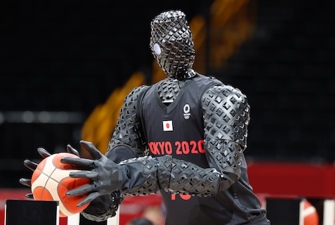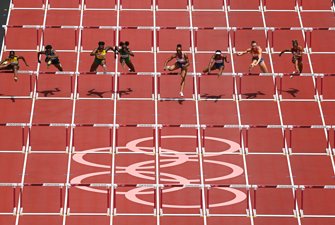Perspectives on the democrAItisation of sports governance: Can artificial intelligence empower athletes?
Like many other technologies, AI is neither good nor bad in itself. But unlike other technologies, AI can pose a serious risk to sports in general and to the democratisation of sports governance in particular.
Historically, sport has lacked democratic muscle. Especially professional and elite sport.
This is due to a number of factors, not least of which is the long-standing focus on winning at all costs and the paternalistic structure of sports. This has meant that the coach’s decision has always been favoured over the athlete’s preference, the wealth of the club over the welfare of the team, and the federation’s concern over the ethics and values of sport.
This also explains why the government of sport has never been an example of good governance. Although some important steps have been taken in recent decades to make sports governance more transparent, accountable and democratic, much remains to be done.
Yet democracy is always lauded as a great ideal by the world’s most powerful sports leaders, and most major sports organisations are set up as centralised democracies, linking local clubs to the international federation.
But the way we understand democracy could be challenged by a new, non-human actor that has entered the world of sports governance in recent years: Artificial intelligence (AI).
The intrusion of AI into sports is not new. AI systems have made their way into every single corner of sport, including its governance. AI systems are currently being used to recruit athletes, assist coaches and referees, prevent injuries, improve performance and engage fans, and the applications are endless. But not all of them are positive.
AI is also behind new forms of doping, illegal betting and match-fixing.
What about AI and democracy in sports? Does AI improve or threaten the power of athletes?
To answer those questions, let us first look at different ways of dealing with democracy, such as we have done over the past four years in the project 'Strengthening Athlete Power in Sport' (SAPIS). SAPIS promotes good practices of athlete participation in sports governance and recommendations on how to improve it. It is run by an alliance of academics and athlete organisations with support from the EU’s Erasmus+ programme.
Why democracy matters in sport
Democracy is a prerequisite for good governance in sports. This is stated in the fundamental principles of the Olympic Charter, the IOC principles of good governance (principles 2.5 and 2.6), and the statutes of every international federation. So why is democracy so important in sports?
Giving athletes a voice in decision-making is important because athletes are the most relevant stakeholders in sports. Simply put, sport cannot exist without athletes, nor should it be governed without them.
Including athletes’ voices in decision-making processes improves the process itself and is also likely to lead to better decisions. Indeed, an inclusive process allows for athlete engagement and increases the quality of the policies that are agreed upon after taking different views and concerns into account.
In short, improving athlete representation in sports governing bodies (SGBs) means improving their legitimacy. In fact, a closer look at democracy reveals how closely it is linked to many other fundamental values of sports governance, such as freedom of expression, equality and inclusion. In other words, the very idea of democracy is rooted in human rights.
Counting hands only?
Even if it seems simple to count raised hands, democratic processes are not always easy to articulate. Especially when these processes involve many people and different concerns. That is because athletes’ representation uses different strategies.
As the SAPIS good practice guide shows, there are at least three main types of athlete representation in sports. Athletes’ commissions or committees are the most common and in my view probably the most important form of athlete representation, as they act as advisory bodies within the sports governing bodies (SGBs).
Athletes’ unions are becoming increasingly important due to their independence from the SGBs. The third type of representation is provided by the growing number of athlete advocacy groups, which usually have a lobbying style and aim to achieve specific goals.
Athletes’ commissions and unions are rooted in the idea of representation. But democracy is not always about representation
Different conceptions of democracy
Democracy can be articulated in different ways. In this report, three types of democratic conceptions have been emphasised.
First, representative democracy is the usual form adopted by Western liberal democracies. Representative democracy is rooted in the idea of someone representing the interests of other people. If the process is fair, the representative is appointed after a free, fair and open election process.
Representative democracy is useful in large societies. However, it also raises much criticism, mainly related to the lack of people’s involvement in political affairs and the lack of commitment of the delegates to the interests of the community they represent.
Second, participatory democracy is a fairer and more open way of taking part in decision-making. Participatory democracy is seen as a way of overcoming the problems of representative democracy and improving the quality of decisions, as it involves the people themselves in the whole decision-making process.
In short, participative democracy gives everyone the chance to be part of the change they want to see in society and sports. This can be achieved through various procedures, i.e., open communication channels or permanent consultation with key stakeholders.
Finally, deliberative democracy should allow athletes to participate in an open, free and public debate. This constructive process of debate and argumentation should lead to agreements and compromises that take into account the interests of all parties involved.
Although it can be argued that deliberative democracy is an idealised version of participatory democracy rather than a distinct type of democracy, it is worth keeping this third conception in mind.
The three conceptions of democracy just described should be seen as complementary rather than as three different types of democracy. They can also be implemented at different levels and stages of the decision-making process.
In any case, all forms of democracy are rooted in human values and reasoning, and in the equal dignity of each individual to have a say in matters that affect him or her.
However, in each and all of these versions, democracy today is challenged by the intrusion of AI into sports governance and the lack of policies on AI governance in sports. It is therefore worth asking whether AI will fundamentally serve or shake the democratic rights of athletes.
The democrAItisation of sports governance
AI systems are designed to achieve a given goal in an efficient way. The goals can be as diverse as improving athletic performance, preventing injuries or providing successful in-game strategies.
AI systems can also help improve governance and democracy in sports. From one perspective, AI can be part of the democratisation of sport and strengthen the voice of athletes.
When AI systems are tailor-made to facilitate deliberative processes, they can inform athletes about the pros and cons of a given situation and provide proportionate advice on the best decision, taking into account the values of sport and the common good.
As explained above, democracy is much more than voting. In order to have a meaningful say in sports governance, it is important to access the relevant information. AI systems can be very valuable in disseminating information, enabling new ways of participating in deliberative processes and even enabling secure electronic voting.
But AI can also be a serious threat to democracy, including the emerging democracy in sports.
Playing with algorithms
As is already happening with big data and social media, AI can be used to spread fake news and manipulate public opinion. Even if social media is not necessarily powered by AI, AI systems can play an important role. For example, bots – autonomous programs that interact with users or other systems – are increasingly being used to manipulate public opinion and influence voters’ preferences.
It is true that manipulating human decisions and experiences is something that propaganda has always been used for. But AI and in particular the rapid development of Large Language Models (LLM) is a much more serious threat because it can confuse people to the point where they are unable to distinguish facts from fiction.
It is certainly not hard to be fooled by AI-generated images, as happened with the fake attack on the Pentagon, the fake arrest of former President Trump, or the prestigious Sony World Photography award to German photographer Boris Eldagsen, who refused it after confessing that he generated the winning image using AI.
Moreover, AI is a powerful tool for finding new ways to push people, especially young people like athletes. As happened with other technologies, using AI technology to nudge people by personalising information and advertising can be an effective tool used by sports leaders or even by the athletes’ representatives to manipulate voters’ opinions and preferences.
That is because the increasing use of AI can easily lead to populism in sports.
Consider the ability of AI to create fake news, putting words into people’s mouths that they have never said, or even using facial recognition algorithms mixed with voice clips to create a fake news story that will pass for real news for a while. The fake interview with Michael Schumacher published by the German magazine Die Aktuelle is just one example of how far this technology can go.
Another important concern is the contribution of AI to the creation of an elite of athlete representatives who may be more concerned with maintaining the status quo than improving athletes’ well-being.
In this sense, it is worth considering how AI is quickly becoming a serious problem for democratic processes. Consider, for example, how generative AI can produce targeted campaign texts, pictures and videos used to mislead voters, impersonate candidates and undermine elections on an unprecedented scale and speed.
It is not difficult to see how this can be used to favour a representative elite with the technical knowledge to do so. Clearly, this situation could jeopardise diversity and public deliberation, undermining the incipient democratisation process rather than strengthening the power of athletes in sports.
Finally, it is important to note that AI systems are fed by data. Undoubtedly, data is a major concern for a number of reasons:
-
Data is not always collected and used in an ethical and legal manner.
-
Data in sport is particularly sensitive as it collects personal information related to health, biometrics and even neural data from athletes’ professional and non-professional activities. Thus, any breach of security in the handling of data can jeopardise the independence and autonomy of athletes and their representatives, seriously compromising genuine deliberative democratic processes.
But even in the best of circumstances, AI could be a dangerous technology that threatens the legitimacy of sports organisations. AI is far from being a transparent technology. This makes it almost impossible for AI to meet the requirements of transparency and accountability that are imposed by the principles of good governance.
But all these considerations aside, making decisions based on AI recommendations implies replacing human agency and the athlete’s voice within the sports organisations for the sake of efficiency. This is not always the best way to achieve good governance and integrity in sports.
Conclusion
AI, like many other technologies, is neither good nor bad in itself. But unlike other technologies, AI can pose a serious risk to sports in general and to the democratisation of sports governance in particular.
That is why there is a need for the development of an ethical framework for the use of AI in sports, and especially for its governance.
This framework should address the priorities of athletes, in particular:
-
autonomy
-
privacy
-
equal and fair access to AI
-
human agency and oversight
-
transparency and accountability.
Overall, however, AI should be used to enhance the integrity of sports and increase the power of athletes in sports governance, rather than replacing them with decisions made by algorithms.







